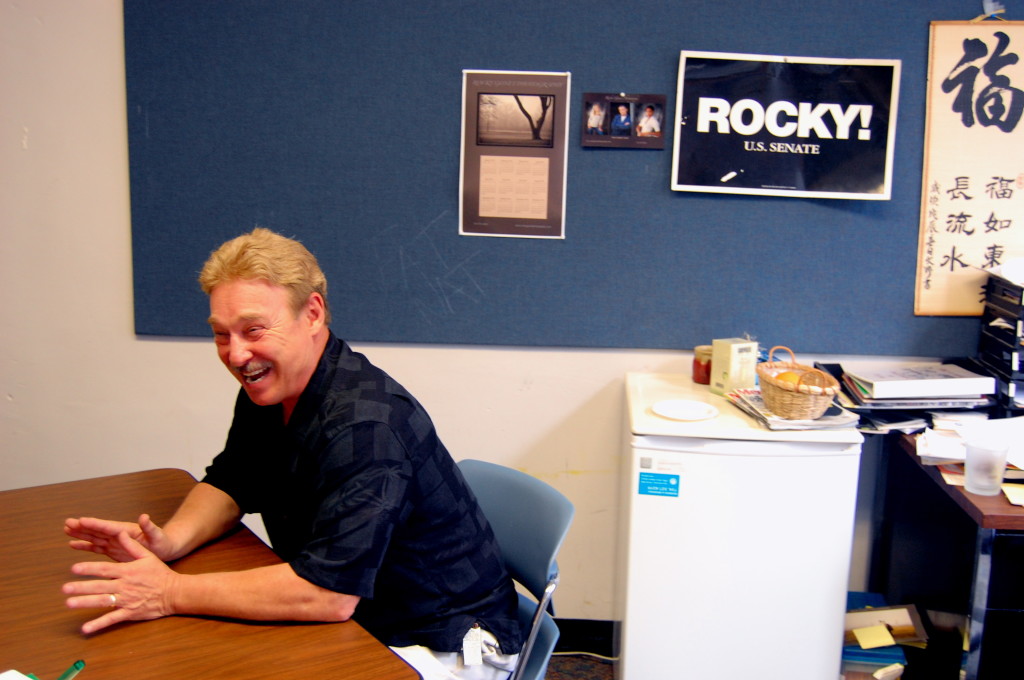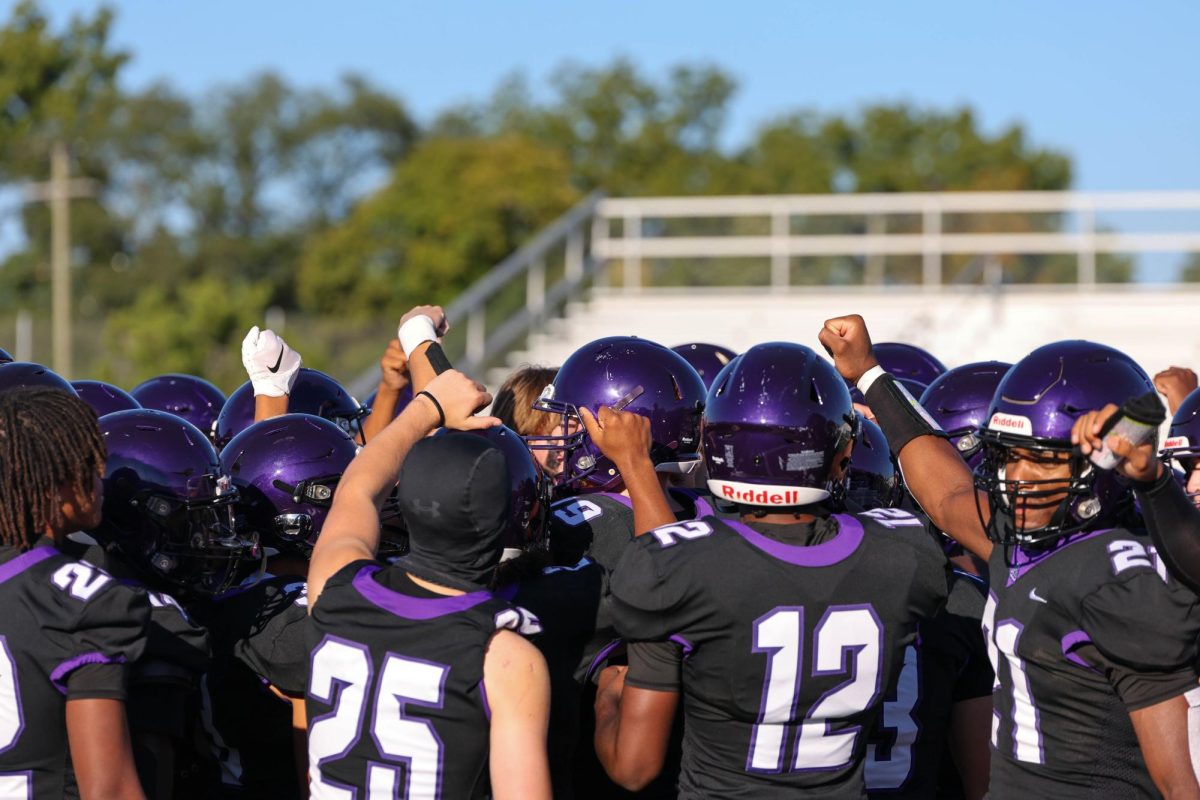DogGonet Rocky, Don’t Leave us Now
June 16, 2010
Rocky Gonet, a social worker at Community High School, didn’t start out the year thinking he was going to retire. However, after the state retirement incentive and 33 years in the Ann Arbor Public School district, Gonet’s letting go.
As an adolescent, Gonet was plagued by the same troubles as his students. “I ran with a fast crowd, and school didn’t have much interest for me… It was all about the social part of school, and I didn’t appreciate the academic part until I went to college,” said Gonet.
Throughout high school, Gonet’s parents’ academic expectations were easily achieved. “My family had maybe a different value system. You know they wanted me to do good in school… If I got a C, my mom was really, really happy,” he said. “If I got a C, then that was like, she’d brag to the neighbors,”
Seventh grade started a cycle of social promotion for Gonet throughout junior high. His chronic truancy led to several petitions filed against him. Although helped was offered, Gonet was unwilling to accept. “It wasn’t that there wasn’t anybody there, it’s just that there wasn’t an impact,” said Gonet.
Due to his attendance and social problems, high school was spent partially in Juvenile Correctional facilities. “You know…I was a bad guy. I broke the law and the law won,” said Gonet.
Being in the Correctional facilities offered Gonet an unexpected boost in his education. “…then when I started getting locked up, school was really easy, because people weren’t that smart. So I went from being at the bottom of the barrel to being a god damn genius,” said Gonet. By accumulating credit, Gonet was able to graduate high school at age twenty.
After graduating, Gonet drove a Pepsi Cola truck for two years.
In 1969, Gonet decided to attend Kent State University after a discussion with his local barber. “It’s interesting …[He] said it was a good place. [He said] you don’t live that far away, and you’re only an hour from Cleveland. So the guy at the barbershop said, yeah, why don’t you try Kent State? He knew somebody that went there,” said Gonet.
However, after two thirds of a year at Kent State, Gonet transferred to Bowling Green State University (BGSU) in Ohio. He admits the reason had mostly to do with his girlfriend at the time. She later went on to become his first wife.
College gave Gonet a second chance at success. “I was ready to learn. I mean, I enjoyed, I actually enjoyed college,” he said. However learning proved to be a struggle for Gonet. “I was at a disadvantage because I didn’t have the vocabulary or the reading skills, you know, simply because I didn’t read. So I had to work really, really hard in college, but I really liked it and I got to see a different side of life,” said Gonet.
He also appreciated being exposed to new people. “I got to see people that, you know, had some goals. Some people that…were honest,” said Gonet. His new friendships, along with a relevant education, contributed to making college the best years of Gonet’s life.
Gonet originally expressed interest in becoming a Driver’s Education teacher. But because of scheduling issues, Gonet switched his class load to major in sociology and history.
In 1972, after three years at BGSU, Gonet went on to the University of Michigan. There, he received his masters of social work. “…I was guided into it. It seemed like an easy transition. You know…[someone said] ‘you ought to be a social worker,’ it just seemed like the right thing to do at the time,” he said. The idea of working only nine months a year also appealed to Gonet.
That same year Gonet married his first wife and had their son, Rocky. Gonet also has two other children, Kalynn and Nick and his stepson Josh from his current marriage to Marcia Schaffer.
Through his years of college and graduate school, Gonet qualified for the National Defense grant. The grant gave Gonet a free education, with the stipulation that he worked in the school system afterwards. “That was the one good thing about my education. With my folks not having any money, I never had to pay for anything,” said Gonet.
He began working for the Ann Arbor Public Schools in 1977 as a social worker at Huron High School. For about 3 years, Gonet also worked at several elementary schools. However, in 1981, he made the decision to come to CHS. “Nobody wanted to work here at the time…they had to fill the spot, so I said I would do it,”
Gonet easily adapted to the unique environment at CHS. “I thought it was a pretty fun place to work because nobody bothered ya. I adjusted pretty well to Community High because at the same time, the one thing that it still had, that it still has today is, it’s a pretty student centered building,”
He also appreciated the special bond between students and teachers, “It was very lackadaisical. You know, a person could come in and want to do a CR in drinking coffee, [and we’d] say alright. That’s okay. We’ll get you credit for that,”
At the time, Gonet remembers a negative stereotype associated with CHS, “It wasn’t like it is now, when people want to come here. It had the reputation, not entirely accurate, that it was kind of a burnout school. People used to say you have either burnouts or professor’s kids,”
The culture of CHS evolved with the welcoming of new teachers, “When we got people like Brian Miller, Judith DeWoskin, Cheryl Grace and Robbie Stapleton, people started to say, you know what, this place needs to change. I don’t know if it was a conscious thing but, it certainly changed,”
After his first few years at CHS, Gonet also became the school court liaison for AAPS. As the court liaison, he traveled from building to building to discover which students weren’t attending class. He then proceeded to schedule an appointment with their parents, in hopes of creating a strategy to attend school more regularly.
As a last resort, he would file a petition against them to the court if their behavior failed to change. In current years, the court has stopped accepting petitions due to the fact that the petitions “bog the (courts) down,”
Gonet refused to use lecturing as a tactic. Instead, he draws from his own experiences to advise his students. “I’m pretty honest in terms of telling kids, ‘I don’t expect you to love school. I’m not even gonna ask you to like it,’ You know? I’m just saying its kind of a necessary evil in our culture right now,”
As a teenager who struggled to graduate from high school, Gonet disproves of the new graduation requirements. “I think that the problems pretty much remain the same. You still have a portion of the population that doesn’t go to school. Like I said, we don’t know how to make people who don’t want to go to school go to school. But I think what has changed is the graduation requirements, which makes it harder to recover,”
He believes there is a misconception of students who don’t attend school. “You know, we have this idea that if somebody doesn’t like school, that there’s apparently something wrong with them. You know, you can dislike sports, you can dislike music, you can dislike food, just about anything in our culture and you’re still okay. But if you dislike school, then they’re always looking for some kind of emotional issue that prevents you from really wanting to learn,”
Fifteen years ago, to become more connected with his students, Gonet decided to teach a Psychology and Film class with his second wife, Marcia Shaffer. Psych and Film will continue to be taught by Gonet and Shaffer as a CR next year. “We try to emphasize movies that kids haven’t seen, that are kind of off beat,” said Gonet. Previous movies shown include Rock Tail, Fresh and City of God.
Gonet jokes about the positives of working with his wife. “Well, like if I’m broke, I can usually get money. Sometimes when she thinks about it, she brings me lunch. It’s kind of fun; she helps me out with Psych and Film, which was a highlight of working at CHS. I just love that class,”
During his time at CHS, Gonet clearly recalls a few key memories. “The thing that stands out the most is when [a student] came to school on Halloween dressed as a vagina. It was a scandal, and he got sent home. Man, I thought that was one of the highlights, because I thought it was so funny,”
Another way Gonet used to connect to his students was through a weight -training group. “We used to meet at lunchtime, a bunch of guys that were kind of troubled, and we’d just go down to the gym and work out and make fun of each other. That was fun. I’ve had a lot of good experiences here,”
Gonet’s plans for the future include following his continual passion of photography. At age ten, he received his first camera from his uncle, and after sitting in on a photography class in college, he became hooked. “It makes your life so much richer when you’re involved in any kind of art form where you can express yourself. Anything that helps you become more observant of the world around you enriches your life.”
He plans to still teach photography at Washtenaw Community College, a job he’s had for the last ten years. Gonet intends to spend more time with his grandson, and help his oldest son Rocky with his photography business.
As Gonet wraps up the year, he’s come to realize it isn’t such a bad time to retire. “I’m pretty happy about leaving. I had a lot of friends here, but you know, I don’t want to wear out my welcome. As you get older, you start to detach a little bit. I’ve been thinking this is good because I haven’t pissed anybody off. I mean I’m leaving on good terms. I’m leaving on my own terms, so I feel pretty good about that,”
There are many lessons Gonet will take with him from his time at Community. “I think I learned that you don’t take yourself too seriously. I think that’s one of the great lessons,” he said.
Gonet also feels that working with kids has proved to be a rewarding experience. “What other people don’t get in occupations is to see kids. Not just as kids, but to see how different each and every one is, and how much smarter they are then you thought they were,” he said. “I think I’ve learned a lot about kids, and it helps keep you young,”
As he has discovered through his years, there’s more to school and life than academics. “People are the most important product. It ain’t about math. It ain’t about science. It ain’t about the grades you get. I mean, the main thing is the people that you’re around, cause this is a pretty kind place. This is the kindest place in the district. I learned about kindness.”










